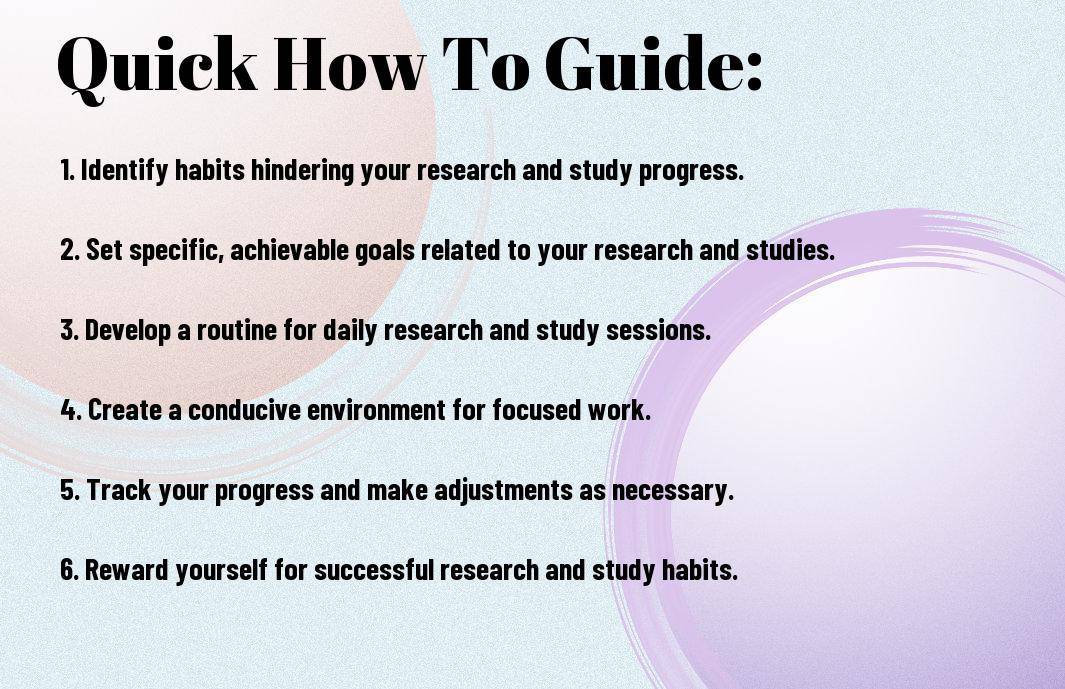You know being a graduate student is no easy feat. Juggling multiple responsibilities like research, coursework, and personal life can be overwhelming. However, by implementing Atomic Habits, you can revolutionize the way you manage your studies and research. This groundbreaking approach focuses on making small, incremental changes that lead to remarkable results over time. In this blog post, we will explore how you can apply the principles of Atomic Habits to enhance your productivity, focus, and overall well-being as a graduate student.
Key Takeaways:
- Start small: Break down your research or study tasks into smaller, manageable habits to make progress consistently.
- Establish a routine: Create a daily schedule that includes designated time for research, studying, and self-care to optimize your productivity.
- Track your progress: Use tools like habit trackers or productivity apps to monitor your habits and make adjustments as needed.
- Focus on consistency: Aim to work on your research or studies regularly, even if it’s just for a short amount of time each day.
- Reward yourself: Celebrate your achievements, whether big or small, to reinforce positive habits and motivate yourself to keep going.
- Stay organized: Keep track of deadlines, research materials, and notes to stay on top of your tasks and avoid feeling overwhelmed.
- Seek support: Connect with fellow graduate students, advisors, or mentors for guidance, motivation, and accountability in managing your research and studies.

Laying the Foundation: Key Concepts for Habit Formation
Now, have you ever wondered why some graduate students excel in managing their research and studies effortlessly while others struggle to stay on track? Understanding the underlying principles of habit formation is the key to unlocking your full potential. If you haven’t already, I highly recommend checking out “Why You Need to Read ‘Atomic Habits’ By James Clear?”. This insightful article investigates into the transformative power of habits and how they can shape your academic journey.
The Habit Loop Explained
There’s a simple yet powerful framework that explains how habits are formed – Cue, Craving, Response, and Reward. This cycle, known as the Habit Loop, is at the core of our behaviors. By recognizing these elements in our daily routines, we can begin to deliberately shape our habits for the better. Understanding how cues trigger our actions, the cravings that drive our behavior, the responses we take, and the rewards we seek is the first step towards building a productive routine.
Small Changes, Remarkable Results: The Compound Effect of Daily Habits
Even the smallest daily habits can lead to remarkable results over time. James Clear, in “Atomic Habits,” emphasizes the power of marginal gains and the compound effect of consistent actions. Each tiny improvement may seem insignificant on its own, but over weeks and months, these habits add up to significant progress. By focusing on making small, positive changes each day, you can harness the power of compounding to achieve extraordinary outcomes in your academic pursuits.
Formation: It’s crucial to understand that habits, whether good or bad, are formed through repeated actions and reinforced by rewards. By intentionally designing your environment to support desired behaviors and breaking down tasks into manageable steps, you can set yourself up for success in academia. Do not forget, consistency is key, and even the tiniest adjustments can pave the way for significant transformations in your research and studies.
Tailoring Atomic Habits to Graduate School
All graduate students know the challenges of balancing research, studies, and personal life. Fortunately, with the principles of Atomic Habits by your side, you can cultivate small changes that lead to significant academic improvements. Let’s explore how you can tailor these strategies specifically for graduate school success.
Identifying High-Impact Habits for Research and Studies
Some habits have a more significant impact on your academic performance than others. For graduate students, high-impact habits may include setting aside dedicated research time each day, breaking down tasks into manageable chunks, regularly reviewing class notes, or seeking feedback from professors. By identifying these key habits and integrating them into your routine, you can streamline your progress and boost your productivity.
Adapting Habit Stacking for Your Academic Routine
Some graduate students find success in adapting the concept of habit stacking to their academic routine. This technique involves attaching a new habit to an existing one, creating a mental link that reinforces both actions. For instance, you can stack the habit of reading research articles with your morning coffee or reviewing flashcards during your daily commute. By incorporating new academic habits into your existing daily rituals, you can enhance your efficiency and make learning more seamless.
Clearly defining which habits are important for your academic success and structuring them through habit stacking can transform your graduate school experience. Note, the key is to start small, stay consistent, and continuously evaluate and adjust your habits to suit your evolving needs. By personalizing these strategies to fit your unique schedule and preferences, you can navigate the demands of graduate school with greater ease and effectiveness.
How to Set Clear Academic Goals
Unlike other aspects of your life, managing research and studies as a graduate student requires a strategic approach to setting clear academic goals. By establishing focused objectives and prioritizing your tasks effectively, you can navigate the challenges of academic life with confidence.
Defining Smart Research Objectives
An crucial step in setting academic goals is defining SMART research objectives. These objectives should be specific, measurable, achievable, relevant, and time-bound. Clearly articulating what you want to achieve in your research will provide you with a roadmap to follow and help you stay on track throughout your studies.
Prioritizing and Sequencing Your Study Goals
Assuming you have multiple academic goals to accomplish, it is crucial to prioritize and sequence them based on their significance and urgency. By focusing on studying one goal at a time and breaking down complex tasks into smaller, manageable steps, you can make progress steadily. This approach not only ensures that you allocate your time and resources efficiently but also helps you avoid feeling overwhelmed by the workload.
Creating an Environment Conducive to Productivity
After understanding the importance of habits in managing research and studies, creating an environment that fosters productivity becomes crucial. Your study space and digital surroundings play a significant role in how efficiently you work and concentrate on your tasks.
Organizing Your Study Space for Maximum Efficiency
While setting up your study space, consider factors like lighting, comfort, and organization. Keep your desk clutter-free and designate specific areas for different tasks. Use organizers, shelves, and storage solutions to keep your study materials easily accessible. Personalize your space with motivational quotes, plants, or pictures that inspire you to stay focused and motivated.
Digital and Social Environments: Tips for Minimizing Distractions
While managing your digital and social environments, implement strategies to reduce distractions. Create specific time blocks for checking emails and social media to avoid constant interruptions. Utilize website blockers or apps that limit your access to distracting sites during study sessions. Establish boundaries with your peers and family members to minimize disruptions during your dedicated study time.
- Set boundaries with your technology use
- Establish a designated study time
After implementing these changes, you’ll notice an increase in your focus and productivity levels. Stay consistent with these habits to create a conducive environment for your research and academic pursuits.
Staying Consistent with Your Habits
Keep your academic journey on track by developing sustainable habits that help you manage your studies and research effectively. Consistency is key when striving for success as a graduate student. Whether it’s staying on top of your reading, writing, or research tasks, implementing atomic habits can make a significant difference in your productivity and overall well-being.
Tracking Your Progress and Maintaining Motivation
Progress Tracking your progress can help you stay motivated and accountable for your academic goals. Consider using tools like habit tracking apps or journals to monitor your daily routines and achievements. Celebrate small wins along the way to keep your motivation levels high and reinforce positive habits. Note, consistency is about showing up every day, even when the going gets tough.
Overcoming Common Challenges and Avoiding Burnout
Maintaining a healthy work-life balance is crucial as a graduate student to avoid burnout. It’s vital to prioritize self-care activities such as exercise, proper nutrition, and sufficient sleep to recharge your mind and body. Know when to step back and take breaks to prevent overwhelm. Seek support from peers, mentors, or counselors if you feel overwhelmed or stuck. Note, it’s okay to ask for help and reassess your priorities when necessary.
Overcoming challenges such as procrastination, imposter syndrome, or perfectionism is fundamental to staying consistent with your habits as a graduate student. Recognize that setbacks are a normal part of the journey and focus on progress rather than perfection. Implement strategies like time blocking, setting realistic goals, and seeking feedback to overcome hurdles. Stay positive and trust the process, knowing that each small step is bringing you closer to your academic goals.
Leveraging Social Support and Accountability
Despite the best intentions, maintaining good habits can be challenging, especially for graduate students juggling research, coursework, and personal commitments. One way to make it easier is by leveraging the power of social support and accountability. According to the Habits Guide: How to Build Good Habits and Break Bad Ones, surrounding yourself with a supportive academic community can significantly impact your ability to stay on track and achieve your goals.
Finding Your Academic Tribe
Your academic tribe is a group of like-minded individuals who understand the unique challenges and pressures of graduate studies. Whether it’s fellow students in your program, supportive faculty members, or online communities dedicated to academic success, connecting with your academic tribe can provide valuable moral support, encouragement, and fresh perspectives on your research and studies.
How to Get the Most Out of Study Groups and Mentoring Relationships
Study groups and mentoring relationships can be invaluable resources in your academic journey. Engaging with study groups allows you to deepen your understanding of complex subjects, improve your communication and teamwork skills, and gain different insights into your research projects. Mentoring relationships with experienced academics or professionals can provide guidance, feedback, and networking opportunities to help you navigate the challenges of graduate studies and advance your career.
Social support and accountability can make a significant difference in your academic success. By actively engaging with your academic tribe, study groups, and mentors, you can stay motivated, overcome obstacles, and make the most of your graduate school experience. Remember that you are not alone in this journey, and reaching out for support can be the key to reaching your full potential.

Refining and Reevaluating Your Habits
Your habits as a graduate student are crucial to your success in managing research and studies. However, it’s important to remember that these habits are not set in stone. You should constantly refine and reevaluate them to ensure they are still serving you well.
When to Pivot: Adjusting Your Habits as Your Research Evolves
An imperative part of managing your research as a graduate student is knowing when to pivot and adjust your habits. Your research will evolve over time, presenting new challenges and opportunities. It’s important to be adaptable and willing to refine your habits to align with these changes. Stay open to new strategies and be willing to let go of habits that no longer serve you well. By regularly reassessing your habits and adjusting them as needed, you can stay on track towards your goals.
Celebrating Milestones and Incorporating Feedback
Incorporating feedback and celebrating milestones are crucial aspects of refining your habits as a graduate student. Feedback from professors, peers, or mentors can provide valuable insights into areas where you can improve. Celebrating milestones, no matter how small, can help you stay motivated and track your progress. By integrating feedback and embracing your achievements, you can refine your habits effectively and continue to grow throughout your academic journey.
Research suggests that celebrating small wins can boost motivation and lead to greater success in the long run. By acknowledging your progress and making adjustments based on feedback, you can cultivate habits that support your academic goals and personal growth.
FAQ
Q: Why is it important for graduate students to develop good study habits?
A: Developing good study habits can help graduate students stay organized, improve productivity, and achieve academic success in their research and studies.
Q: How can atomic habits help graduate students manage their research and studies more effectively?
A: Atomic habits focus on making small, incremental changes that can lead to significant improvements over time, making it easier for graduate students to stay motivated and on track with their work.
Q: What are some examples of atomic habits that graduate students can implement in their daily routines?
A: Examples of atomic habits include setting specific study goals, creating a study schedule, breaking down tasks into smaller, manageable steps, and eliminating distractions during study sessions.
Q: How can graduate students stay consistent with their atomic habits?
A: Graduate students can stay consistent with their atomic habits by tracking their progress, rewarding themselves for small wins, and seeking support from peers or mentors.
Q: What are the benefits of using atomic habits for managing research and studies?
A: The benefits of using atomic habits include improved time management, increased focus and concentration, reduced procrastination, and ultimately, better academic performance.
Q: How long does it take to form a new atomic habit?
A: Studies suggest that it may take anywhere from 21 to 66 days for a new habit to become automatic, depending on the individual and the complexity of the habit.
Q: Can graduate students use atomic habits to improve their work-life balance?
A: Yes, graduate students can use atomic habits to create a better work-life balance by prioritizing self-care, setting boundaries, and scheduling time for relaxation and leisure activities.



